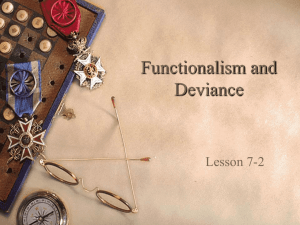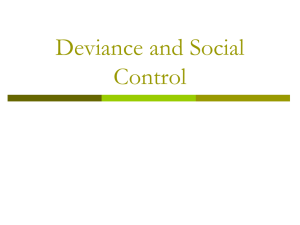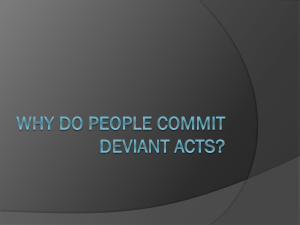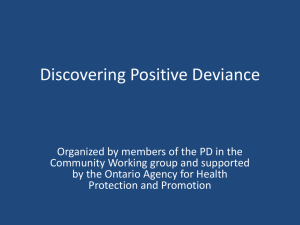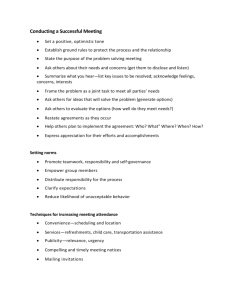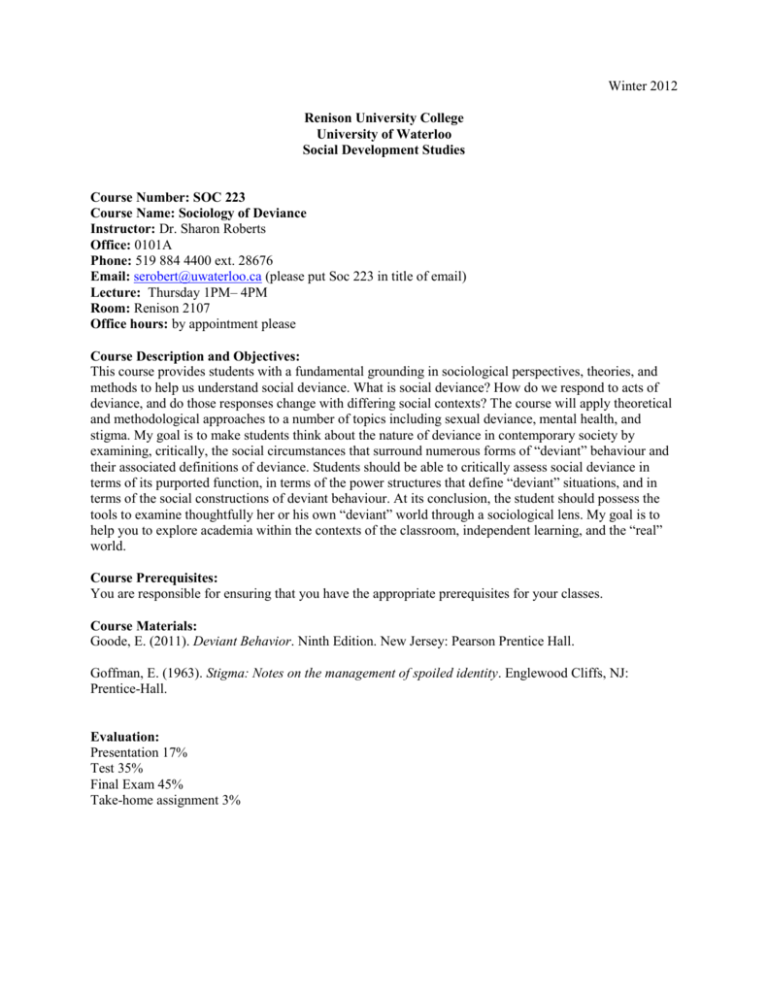
Winter 2012
Renison University College
University of Waterloo
Social Development Studies
Course Number: SOC 223
Course Name: Sociology of Deviance
Instructor: Dr. Sharon Roberts
Office: 0101A
Phone: 519 884 4400 ext. 28676
Email: serobert@uwaterloo.ca (please put Soc 223 in title of email)
Lecture: Thursday 1PM– 4PM
Room: Renison 2107
Office hours: by appointment please
Course Description and Objectives:
This course provides students with a fundamental grounding in sociological perspectives, theories, and
methods to help us understand social deviance. What is social deviance? How do we respond to acts of
deviance, and do those responses change with differing social contexts? The course will apply theoretical
and methodological approaches to a number of topics including sexual deviance, mental health, and
stigma. My goal is to make students think about the nature of deviance in contemporary society by
examining, critically, the social circumstances that surround numerous forms of “deviant” behaviour and
their associated definitions of deviance. Students should be able to critically assess social deviance in
terms of its purported function, in terms of the power structures that define “deviant” situations, and in
terms of the social constructions of deviant behaviour. At its conclusion, the student should possess the
tools to examine thoughtfully her or his own “deviant” world through a sociological lens. My goal is to
help you to explore academia within the contexts of the classroom, independent learning, and the “real”
world.
Course Prerequisites:
You are responsible for ensuring that you have the appropriate prerequisites for your classes.
Course Materials:
Goode, E. (2011). Deviant Behavior. Ninth Edition. New Jersey: Pearson Prentice Hall.
Goffman, E. (1963). Stigma: Notes on the management of spoiled identity. Englewood Cliffs, NJ:
Prentice-Hall.
Evaluation:
Presentation 17%
Test 35%
Final Exam 45%
Take-home assignment 3%
Lecture Schedule
Date
Topic
Thur Jan 5
Thur Jan 12
Introduction/Outline
Theory I
Film
Thur Jan 19
Theory II
Thur Jan 26
Alcohol
Thur Feb 2
Sexuality
Thur Feb 9
Mental Health – Eating
Disorders Lecture
**Guests are welcome
Violent Behaviour
Film
Thur Feb 16
Thur Feb 23
Thur Mar 1
Thur Mar 8
Thur Mar 15
Thur Mar 22
Chapter Reading in
Deviant Behavior
Reading Week
Test
Cognitive Deviance
Assignment Handed Out
Guest Speaker
Assignment Due
Erving Goffman - Stigma
Thur Mar 29
Goffman II
PAD awards
Final Exam during exam period – TBA
Schedule of Presentations
No Presentation
Goode 1
Goode 2
Goode 3
Recommended:
Goode 4
Goode 7
Goode 8
Goode 9
Goode 6
Recommended:
Goode 5
Goode 11
Goode 13
Goode 12
Goffman 1-2
Goffman 3-5
Use the “find a group” discussion
board to help you find a group
No Presentation
Call “dibs” on your presentation
via D2L Jan 5th evening
*see below for important details
Group Presentation 1
Group Presentation 2
Group Presentation 3
Group Presentation 4
Group Presentation 5
Group Presentation 6
No presentations
Group Presentation 7
Group Presentation 8
No presentations
No presentations
Group Presentation 9
Group Presentation 10
Group Presentation 11
Group Presentation 12
Group Presentation 13
Group Presentation 14
Reserved for Catch-up
Course Format: The class meetings will be a mixture of lectures, student seminars, and films.
Perceived Acts of Deviance (PAD): Each week, we’ll take a few minutes at the beginning, middle, or
end of class to discuss perceived acts of deviance that you have witnessed or heard about. I encourage you
to keep a small notebook with you to keep track of them. You are also encouraged to report PADs on
D2L. Let’s have some fun with this! You can also create your own act of social deviance
(ABSOLUTELY NOTHING ILLEGAL!!!! I don’t do bail.) by yourself or in a group and report the
reactions of others. For example you could wear your Halloween costume on a regular day, order 5
desserts instead of dinner, face the wrong direction in an elevator, etc. These are social acts of deviance,
not illegal acts of deviance. Please do not do anything unsafe. At the end of the course we will vote on the
class favourite.
Lectures: Regular attendance at lectures is essential as many lectures will cover material not in the text.
If you miss a class (and this includes classes where films are shown), you should make arrangements to
obtain notes from another student. I will not supply students with copies of my lectures. For logistical
reasons, films cannot be shown out of class. Partial lecture notes can be found on D2L.
Presentation: Each student will work in a group of three or four. Choose a topic in which you are
interested. The presentation should take 20-25 minutes. Students are encouraged to be creative. The main
goal of the presentation is to facilitate a class discussion about the selected topic. Be critical. Be
insightful. Be academic. Let your presentation and discussion questions show that you have given the
topic/theme some thought. Based on attendance, the presentations may or may not be testable material.
Missed presentations will be treated in the same way as missed exams.
Some ideas for presentations: School Shootings, Suicide, Suicide Bombing, Terrorism, Self Injurers,
Animal Cruelty, Intimate Stalking, Online Male Escorts, Serial Murder, Drug Use on Campus.
Please do not choose eating disorders or furries (will be voided). I have some articles in my office that
you can look at if you need help with ideas.
Presenting an argument or a position to a large group can be an invaluable experience that can assist you
in your career pursuits (reminder for CV/résumé, presentation with 40+ audience). Mastering “good
presentations skills” can be the “advantage” that will get you the job, or at least put your résumé on the
top of the pile. I hope you will take advantage of the opportunity to hone your presentation skills and add
to your résumé at the same time.
IMPORTANT: Dibs on Presentations
This is your chance to call “dibs” on the presentation you want to do. This will be a first-come firstserve affair.
Thur Jan 19
Thur Jan 26
Thur Feb 2
Thur Feb 9
Thur Feb 16
Thur Feb 23
Thur Mar 1
Thur Mar 8
Thur Mar 15
Thur Mar 22
Group Presentation 1
Group Presentation 3
Group Presentation 5
No presentations
Group Presentation
No presentations
No presentations
Group Presentation 9
Group Presentation 11
Group Presentation 13
Group Presentation 2
Group Presentation 4
Group Presentation 6
No presentations
Group Presentation 8
No presentations
No presentations
Group Presentation 10
Group Presentation 12
Group Presentation 14
Decide on your topic and week.
Beginning at 10:00PM on Jan 5th, you can sign up for a presentation slot.
Please state in the title of post:
1) Presentation Date
2) Presentation Number
3) Presentation Topic
e.g., Jan 19th, Presentation 2, Goths
In the body of the message list the first and last names of all members of the group. Remember that you
need to have at least 3 people in a group.
If any of these instructions are not followed, the entry is void.
Remember, you can only sign up AFTER 10PM on Jan 5th. If you sign up before then, your entry is void.
If someone has posted the presentation date, presentation number, and topic, and they have at least 3
people in their group, then they have successfully called “dibs” on it.
NOTE: If you make a mistake on this information (i.e., you input the wrong date or number or do
not have at least 3 people listed in the group), then you have not called dibs, and the topic is still up
for grabs. Any disputes will be resolved in favour of accuracy.
Exam Information: The test and final exam will be multiple-choice and/or short answer. The tests will
cover lectures and readings (potentially including one question from each presentation).
To ensure fairness in grading, all/any short-answer components of exams will be marked with student
numbers as the student identifier. The format will be discussed during class in the weeks prior to the
examination dates.
The test will be held in class and the final exam during the exam period. You should not finalize your
travel plans until the exam schedule has been announced and you are certain about the date and time of
your final exam. Exam dates, once they have been set by the Registrar’s Office, are firm and will not be
changed.
Final Exam: The final exam is cumulative (text) and will cover all selected chapters from the Goode
text in the course (second half weighted more heavily). It will also contain one question from each
presentation following the first test (read: the presentations are not cumulative). Specifically, the final
exam contains questions selected from the readings from the first half of the course, and the lectures,
readings, and films covered in the second half of the course. You will also need to read Goffman’s book
for the final exam. More details will be given in class.
Take Home Assignment: You will have a take home assignment worth 3%. Details will be given during
class.
Accommodation for Illness or Unforeseen Circumstances: The instructor follows the practices of the
University of Waterloo in accommodating students who have documented reasons for missing quizzes or
exams. See http://www.registrar.uwaterloo.ca/students/accom_illness.html
Academic Integrity: In order to maintain a culture of academic integrity, members of the University of
Waterloo community are expected to promote honesty, trust, fairness, respect and responsibility.
Academic Integrity website (Arts):
http://arts.uwaterloo.ca/arts/ugrad/academic_responsibility.html
Academic Integrity Office (UW):
http://uwaterloo.ca/academicintegrity/
Discipline: A student is expected to know what constitutes academic integrity [check
www.uwaterloo.ca/academicintegrity/ ] to avoid committing academic offences and to take responsibility
for his/her actions. A student who is unsure whether an action constitutes an offence, or who needs help in
learning how to avoid offences (e.g., plagiarism, cheating) or about “rules” for group work/collaboration,
should seek guidance from the course instructor, academic advisor, or Renison’s Administrative Dean.
When misconduct has been found to have occurred, disciplinary penalties will be imposed under Policy
71, Student Discipline. For information on categories of offences and types of penalties, students should
refer to this policy www.adm.uwaterloo.ca/infosec/Policies/policy71.htm . For typical penalties check
Guidelines for the Assessment of Penalties,
www.adm.uwaterloo.ca/infosec/guidelines/penaltyguidelines.htm .
Grievance: A student who believes that a decision affecting some aspect of his/her university life has
been unfair or unreasonable may have grounds for initiating a grievance. Read Policy 70, Student
Petitions and Grievances, Section 4,
www.adm.uwaterloo.ca/infosec/Policies/policy70.htm
Appeals: A student may appeal the finding and/or penalty in a decision made under Policy 70 - Student
Petitions and Grievances (other than regarding a petition) or Policy 71 - Student Discipline if grounds for
an
appeal
can
be
established.
Read
Policy
72
Student
Appeals
www.adm.uwaterloo.ca/infosec/Policies/policy72.htm .
Accommodation for Students with Disabilities: The Office for Persons with Disabilities (OPD), located
in Needles Hall, Room 1132, collaborates with all academic departments to arrange appropriate
accommodations for students with disabilities without compromising the academic integrity of the
curriculum. If you require academic accommodations to lessen the impact of your disability, please
register with the OPD at the beginning of each academic term.
Turnitin.com: Plagiarism detection software (Turnitin) may be used to screen assignments in this course.
This is being done to verify that use of all material and sources in assignments are documented. In the
first week of the term, details will be provided about the arrangements for the use of Turnitin in this
course. See: http://uwaterloo.ca/academicintegrity/Turnitin/index.html for more information.
Software designed to detect cheating may be run on the exams, where computer-marked multiple choice
tests and/or exams will be subject to submission for similarity review by software that will check for
unusual coincidences in answer patterns that may indicate cheating.


